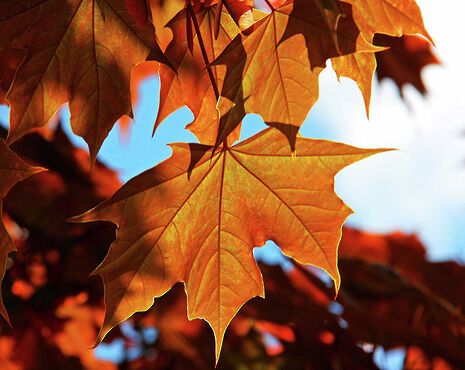A plate of poetry, please: Leaves and lovers
Jade Cuttle ponders on how trees reflect human life

If you stethoscope a tree, you can hear the hum of its heartbeat, shivering down each sinewy spine; the tangle and turn of its watery threads, you can hear each snap and snarl. Its deep rumble is very different to the dull human thump: more like amplified vibrations. Still, it defiantly voices the tree being very much alive. It is best to listen on a warm day, when lots of water is passing through its cells and mixing with air on its way upwards. I am no scientist. But I know that stethoscoping a tree can produce a symphony of tiny strange popping sounds that pierce through the imagination, perhaps – as a scientist knows – in the synthesis of symbolic poetic moments.
As every Homertonian has tirelessly been told, our college is far away from civilisation. At the same time, however, we have been endowed with the beautiful chance for poetic reflection on the bike ride to lectures. The meadows can be a relaxing meditation for the mind, except when you have to suddenly break before the huge herd of cows blocking the path. It is pondering whilst pedalling along these misty mornings that I mumble through a philosophy of trees. The slight resemblance of its vascular system to human veins – as it pulses water, dissolves nutrients and food between its bark-lined body parts – is only the first point of dwelling for the poetic mind.
As seasons unravel in search of summer and its sun, we have escaped the dying light of autumn for the moment. However, its melancholic memory of decay remains etched into the collective mind. There is such poetic beauty in branches stripped back to bare bone, a striking stance of solitude, particularly in the human similarity it solicits. I muse to myself, perhaps as a form of procrastination from the dissertation which is due for that day’s supervision. I muse that, even though the tree has lost its leaves, it may be haunted by the memory of their warmth.
I see this in the same light of a lover or loved one never truly leaving our side; long after they have gone, their shadow haunts our mind. The ghost of a grasp, the trace of touches left behind, if the warmth was strong enough. Strangely, it may last until death turns us cold.
There is probably too much human feeling projected upon, what is, after all, but the textured bark of a tree. Nevertheless, placing science to the side for just one second in favour of what some may call metaphorical nonsense, let us truly realise the resourcefulness and resilience of these creatures: thriving despite their dark and difficult times, clinging to the shadow of where a green leaf should be growing. It summons respect and reflection.
There are times when we, as humans, may think we stand tall and strong, proud with our heads held high, but we hold the trunk of our torso tight in that position just before the tipping point, clinging onto the brief stasis between the sway then fall. In short, we may still be so weak. After all, the pendulum of our heartbeat is always swaying towards other people, between friends and family and lovers and others for validation, particularly on social media, and of course in the academic setting. Whilst trees may lean towards the light, they do not lean like we do.
The reflection of agency in asking whether the leaf lets itself fall, whether it is thrown away by the tree, or whether they are torn apart from each other by another force is a reflection on amorous intent. It may be developed as a useful tool for understanding the end of a relationship.
If the leaf is believed to let itself fall, the situation may be seen in a light of self-sacrifice; alternatively, as freeing itself as if from a hand that holds too tight. This leaf may be bold and brave in leaping towards the endless possibility of sky, unsatisfied with simply settling upon the ground under the gaze of the tree, ever hopeful that fall will become flight. Though maybe it stems more from repulsion with the mess it has created, throwing away its leaves like they have become a burden in their decay, threatening, like disease or infection.
Alternatively, perhaps one will deduce the parting as with reluctance: the tree wishing to cling to each of its leaves for always, branches like outstretched arms reaching beyond its grasp, but ultimately, life getting in the way. That said, all leaves are different and so, if there's any sense in the above at all, then no single leaf will leave its tree in the same way.
Sometimes I think it must be heart-breaking to be a tree and lose so many leaves over and over again. But then I remind myself that trees do not possess human perception or feeling. In many ways, I feel like a tree, before remembering that humans are not made of leaves and losing out on love is what we need to grow.
If there is a scientist within you with an interesting reflection upon this, please email jslc2@cam.ac.uk.
 News / Downing investigates ‘mysterious’ underground burial vault 29 December 2025
News / Downing investigates ‘mysterious’ underground burial vault 29 December 2025 News / Unions protest handling of redundancies at Epidemiology Unit30 December 2025
News / Unions protest handling of redundancies at Epidemiology Unit30 December 2025 Lifestyle / Ask Auntie Alice29 December 2025
Lifestyle / Ask Auntie Alice29 December 2025 Features / ‘Treated like we’re incompetent’: ents officers on college micromanagement30 December 2025
Features / ‘Treated like we’re incompetent’: ents officers on college micromanagement30 December 2025 Science / Astronomical events to look out for over the break29 December 2025
Science / Astronomical events to look out for over the break29 December 2025









